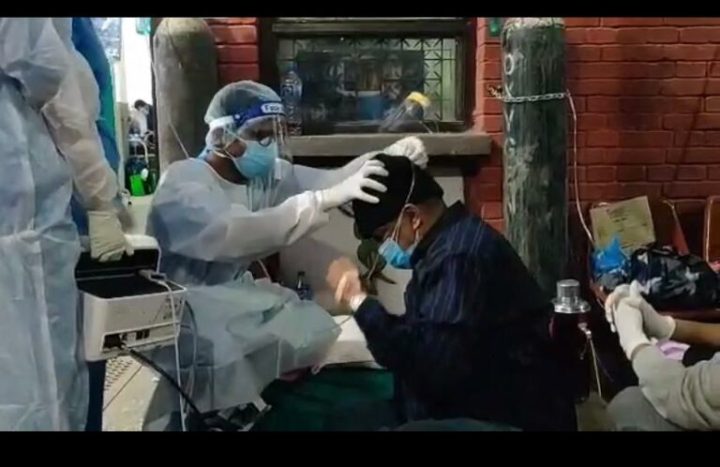Kathmandu: Shortly after I started a conversation with Dr Anup Bastola, a consultant of tropical medicine at Sukraraj Tropical and Infectious Disease Hospital, in Teku, he recalled some heartbreaking moments he experienced during the second wave of Covid-19.
A 42-year-old male came to the hospital after experiencing breathing difficulties while doing some household work. The patient was waiting for a bed outside of the emergency ward. After Bastola attended him, an X-ray was performed. But within three hours, he had already succumbed to the virus.
A 60-year-old male was in critical condition after testing positive for the coronavirus. The patient, who was the father of Dr Bastola’s friend, died on the course of treatment on the 21st day.
Incidents like this can rattle a doctor.
“I am in a responsible position, and I know I should control my emotions,” said Dr Bastola. “But, having said that, you break down sometimes. I have seen so many young people dying of Covid-19 in the second wave of the pandemic. It is heartbreaking.”

The second wave of the pandemic is deadlier and more lethal compared to the first. “In the first wave, only old people, apart from a few exceptions, experienced severe symptoms,” Dr Bastola explains. “In the second wave, I have seen young people gasping for breath and succumbing to the viral disease.”

I met Dr Bastola outside of the ICU ward at lunch time. When I reached the hospital, the ward was full of patients. “There are no beds available for new patients,” Dr Bastola told me. “All the beds in the ICU ward are occupied by serious Covid-19 patients—young ones.”
The Teku Hospital, the only infectious disease hospital in the Kathmandu Valley, has 28 ICU beds and 22 ventilators. The hospital has managed to add 15 ventilators and 26 beds but that is not enough. “We still have a huge crunch of resources,” Dr Bastola said.
“I have seen people cry outside of the ward all night. How can I sympathize with them when their patients are losing battle to Covid-19 inside the ICU ward?”
In mid-May, when there was a massive shortage of beds and resources, patients waited for beds outside of the emergency ward of the hospital. “We were out of beds, and there was a similar situation in all Covid-19 hospitals,” Dr Bastola added. “How could we turn away patients in such situations? The hospital tried its best to provide services to patients, even setting up makeshift beds on the corridor.”

When asked how heartbreaking it is to handle painful situations, Dr Bastola said there is no other option than to hold your emotions inside in front of patients. “I have seen people cry outside of the ward all night. How can I sympathize with them when their patients are losing battle to Covid-19 inside the ICU ward?” he said.
Although medics try their best not to break down, there have been many instances when staff have failed to hold their emotions, said Dr Bastola, citing an incident.
During treatment, a few patients died of Covid-19 in the emergency ward in mid-May, when the number of daily cases was as high as 9,000. As Dr Bastola reached the emergency ward, a staff rushed to him, hugged him, broke down, and said, “Doctor, patients are dying. I am scared. This breaks my heart. I also have a family.”
“We all were scared, and still are. I have a wife and a son. Every day, when I go home, I feel scared. I have been staying in a separate room for a really long time,” said Dr Bastola, who sometimes stays at the hospital up until 2 in the morning.

Even at midnight, Dr Bastola gets calls from people asking if there is a bed available in the hospital. “No!” This is what Dr Bastola has been replying to people for the last few weeks.
“Sometimes when I complete my rounds and check my phone, I see 150-200 missed calls and texts,” he said. “From media persons to people seeking help, they call me. I try my best to help people, but sometimes I fail to offer any help.”
Despite working tirelessly to save lives, there have been many incidents when Dr Bastola has been criticized. Recently, he was heavily criticized by family members of a patient who died on the course of treatment at hospital.
“We always try our best to save lives, but sometimes we fail. It breaks our heart too.”

In these difficult times, the only thing that gives satisfaction to Dr Bastola is saving the lives of patients. “The biggest 1achievement or satisfaction I can get is a “Thank you” from a patient before they leave the hospital,” said Dr Bastola.
When asked if the Covid-19 situation is slowly coming under control, Dr Bastola said, “Yes, it is. But for how long?”
“Even after the first wave, doctors were continuously urging people to follow health protocols. But we did not seem to care. Later, we faced the consequences.”
The only solution against Covid-19 is vaccination, he said. “Those who have been vaccinated have shown no severe symptoms. The only way forward is vaccination, vaccination, and vaccination.”














Comment